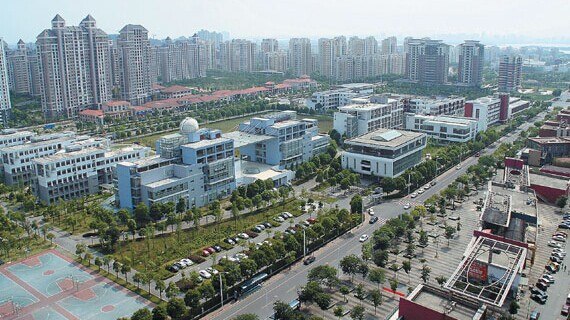

Managers say Suzhou Industrial Park needs to be operated in a market-oriented way. Provided to China Daily
Twenty years ago, China and Singapore put their heads together and came up with a winning idea
"One park, two mindsets," could easily be the motto of Suzhou Industrial Park, which drew on the inspiration of China and Singapore for its creation 20 years ago and draws on them to keep it ticking today.
Further than that, Zhao Zhisong, president of the park's operator, China-Singapore Suzhou Industrial Park Development Group Co Ltd, reckons it mirrors reform and opening-up.
"It is just like the thinking behind China's reform and opening-up, which is to learn from the outside world. The thing that makes our company unique is that right from the start it has been based on a balance of Singaporean experience and Chinese thinking," says Zhao, 44, in his 19th-floor office in the park.
Zhao, who graduated from Jiangxi University of Finance and Economics with a Bachelor's degree in business administration, joined the company in 1995.
Though the company has government roots, it is very market-oriented, he says.
"The international mindset created by working with Singapore is important in driving the company," says Zhao.
"One important thing we have learned from Singapore is that we should operate and develop the park in a market-oriented way."
China-Singapore Suzhou Industrial Park Development Group was founded in 1994 with an agreement between the governments of both countries.
At first, the board consisted of 24 companies from the Singaporean side, which owned 65 percent of the shares, and 14 companies from the Chinese side owning the rest. Now Chinese shareholders own more than 50 percent of the shares, Zhao says.
The company has more than 40 subsidiaries and employs about 3,000 people and it has total assets of 20 billion yuan. It had revenue of 6 billion yuan, last year, 20 percent more than the year before.
The company now plans to become listed on the A-share market, Zhao says.
"We expect to go public by the end of this year."
The park enjoys many advantages by being in Suzhou, he says.
"Suzhou's economic growth started quite early. In the 1980s its township enterprises became quite developed. It also owns complete industrial chains in many industries and has a deep well of skilled labor."
Given that the company's management strategy is one of prudence and stability, it has no plans to go abroad, he says.
"We are focused on development in the Yangtze River Delta region. Now is not the right time for us to develop internationally, although we do plan to seek some overseas funding."
Talent is the most important factor for the sust, he says.
"To do urban planning well you need comprehensive strategic thinking and to be across almost every aspect of it. The business is growing rapidly, and we lack that kind of talent. We also need international management professionals."
Zhao says that based on the experience of his company and of other companies, the industrial park needs to follow the path of urbanization.
"We have always embraced the goal of building the company into a leading enterprise in the newly urbanized China."
The Suzhou park is unusual in that unlike many other industrial parks throughout the country it is not only a business zone but is also suitable for people to live in, he says.
When he makes plans for the park he usually asks himself whether he himself would choose to live there, he says.
"Judging whether this is a new type of urbanization or not is fairly easy. It comes down to whether it focuses on people."
Now there are about 220,000 people live in the park.
As the park grows, the company is committed not to destroy the original landscape and makes every effort to maintain the original characteristics, he says.
"We have sometimes even gone to the trouble of creating a park to protect one tree."
Social and political impacts as well as economic benefits need to be taken into account when planning, he says.
"Only if those three factors are coordinated can urban planning be sustainable. We have sought to make economic and social progress and at the same time ensure that significant historical heritage is preserved."
Zhao has seen a lot of the world and says his favorite places are Seattle in the US and some small towns of Europe.
"The biggest difference between China and developed countries is the countryside. When the company makes decisions we pay heed to farmers' interests."
With some plans, the company has drawn on the experience of Italy in preserving farmland and keeping farmers employed, he says.
"This also ensures that in urban planning farmers have something to gain."
Copyright ©1999-2018
Chinanews.com. All rights reserved.
Reproduction in whole or in part without permission is prohibited.